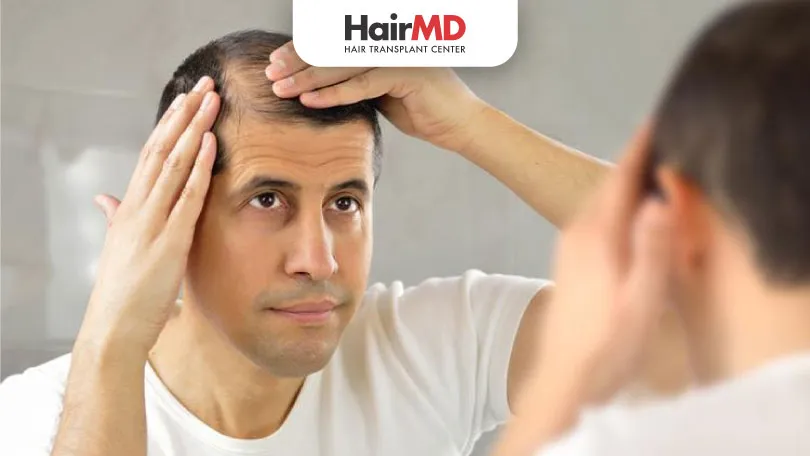1st July, 2023

Most men and women will notice a gradual loss of hair density as they age or experience hair thinning. But according to a 2019 article published by Harvard Medical School, four in 10 people will experience genetic hair loss. A tendency for genetic hair loss may be inherited from both sides of the family.
So, how do you know if your hair problems are inherited or a result of stress or disease? Genetic hair loss, also known as hereditary pattern baldness, almost always starts as a receding hairline or a patch of hair thinning over the top of the head in men. Conversely, women may notice a widening of their partition along with reduced hair density on the crown.
Men usually experience pronounced hair loss or almost balding that starts at the temples or hairline and proceeds in an M-shaped pattern. Genetic hair loss in women is often less obvious but more widespread.
On the other hand, if you are losing hair from the back of your head or in clumps or patches, the hereditary factor can most of the time be ruled out, but it still needs a doctor’s attention.
What’s covered in the article?
- Hair loss treatments that can help
- Conclusion
Hair loss treatments that can help
There are many options that can slow down the development of hair loss. Your dermatologist or hair care specialist can guide you in choosing the correct treatment option for your hair problems. Let’s look into some of the common treatments given for hair loss.
Minoxidil

Minoxidil is a solution you apply twice daily to your scalp. It works by stimulating blood circulation to the affected area of your scalp, thickening and strengthening the hair follicles in the process. Both men and women can use Minoxidil. Results usually start showing after four to eight months of application.
Finasteride
Finasteride is a prescription pill that addresses genetic hair loss by preventing testosterone from being converted to dihydrotestosterone (DHT) which is mainly responsible for weakening and shrinking the genetically predisposed hair follicles halting hair growth. An FDA-approved medication for male pattern baldness, Finasteride is taken once daily and, if used consistently, has a high success rate at slowing down genetic hair loss.
Hair Transplantation
Ideal surgical candidates for hair transplantation are those with high hair density in the donor site over the back of the scalp (occipital scalp) and extensive hair loss or thinning of the frontal scalp.
Tiny plugs of skin containing from one to 5 hairs are moved from the back or side of the scalp to a bald area. Up to 700 individual grafts may be necessary to complete treatment. It may take up to a year or sometimes more to see the full benefit of hair replacement surgery. Patients undergoing hair transplants should be made to see the realistic expectations of the potential results achievable.
Platelet-rich Plasma

PRP is concentrated blood plasma that consists of approximately 3 to 5 times the number of platelets. PRP (Platelet Rich Plasma) therapy is one of the most advanced, non-surgical, therapeutic procedures to combat hair loss conditions in hair loss patients with requirements of hair growth stimulation.
PRP therapy is widely used in hair restoration to generate natural-looking results. It helps activate the hair roots in the dormant stage and induces hair growth within months. PRP also increases the blood vessels surrounding the follicular hair bed and, in turn, improves the blood supply to the hair follicles so that they are supplied with the essential nutrients.
Cosmetic Aids

Since so much of the morbidity of hair loss lies in body image disturbances, cosmetic aids are an integral part of management options. These include hairstyling techniques, camouflage products, hair replacements, accessories, and additions.
Camouflaging products tend to cover exposed areas on the scalp and hide visible hair loss. They also provide a sort of lift at the base of the hair shaft, which results in generating increased volume. These products are best suited to people with mild to moderate hair loss, whereas those with more severe hair problems may not achieve a natural appearance after application.
Do You Know?
Nearly 250 Patients Visit HairMD
Everyday For Various Hair Concerns?
(You are one click away from flawless skin)
Meet Our Dermatologists
Conclusion
Managing genetic hair loss is possible with the right approach and timely interventions. While genetic factors play a significant role, treatments such as medications, hair transplants, and lifestyle changes can help slow down hair loss and even promote hair regrowth.
Consulting with a qualified dermatologist or hair specialist is essential to determine the best course of action based on individual needs. By being proactive and staying informed, you can effectively manage genetic hair loss and maintain the health and appearance of your hair.
The sooner you address the symptoms of genetic hair loss, the more likely you are to prevent irreversible damage. Speak to experienced dermatologists at HairMD Pune today to know your potential hair loss treatment and begin your journey to a fuller head of hair.
Further Reading
Hair Loss – Could It Be a Sign of a Bigger Health Problem?
Find effective hair regrowth treatments for women. Explore solutions like PRP, medications, and more to combat hair loss with expert advice from HairMD.
Do Hats or Helmets Cause Hair Loss?
Discover the truth about Helmets Cause Hair Loss. Learn how improper helmet use & effective tips to maintain healthy hair with HairMD can affect hair health.
Top Hair Growth Treatments for Women: Your Ultimate Guide
Find effective hair regrowth treatments for women. Explore solutions like PRP, medications, and more to combat hair loss with expert advice from HairMD.
Itchy Scalp and Hair Loss: Causes, Treatments, and Prevention
Itchy scalp and hair loss can be troubling, hinting at deeper scalp and hair health issues. Discover the connection in this comprehensive guide.
Have thoughts? Please let us know
We are committed not only to treating you, but also educating you.











